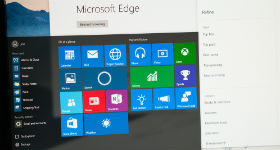At the end of the opening keynote at the Dell World conference there was an interesting moderated discussion between Michael Dell and Satya Nadella. What made it fascinating was the moderator’s willingness to really question the CEOs, making the executives really uncomfortable and forcing them on their heels. Out of this there were some interesting points that got captured. Let’s explore some of them.
Surface vs. Dell PCs
This clearly was a sore point between the two CEOs and one of the areas of most discomfort. Michael Dell kept positioning his offerings as far more complete and far more value priced while Satya was more on the defensive with regard to the hardware (likely because this was Dell’s event, not Microsoft’s). In the end they positioned the Microsoft offering as more focused while spinning the Dell offering as far more broad.
I expect Dell will be watching Surface far more closely and they already have plans to resell some of the products. If anyone things Dell is happy that Microsoft is doing hardware they weren’t watching the body language.
Windows 10
Interestingly, Michael Dell was the most excited about Windows 10. He was almost giddy. This is Microsoft’s product and it felt clear that he is far more reserved in terms of personality. Historically this has been the other way around, the OEM reserved (largely because they were disappointed with the product) and Microsoft excited but seemingly disconnected from reality. In the end, the customer (and the OEM is the customer) for Windows should be the one that is the most excited, with Microsoft more pleased with that excitement than in the product itself.
Big Mergers
It was clear that Satya has no interest in doing a big merger. Given that it was his predecessor’s failed attempt to buy Yahoo that cratered Microsoft’s stock, I can certainly see why. But if anyone is looking for Microsoft to buy a big company, or an expensive one, you shouldn’t hold your breath. Dell was clearly very excited about buying EMC, and depending on how well it works out they might be interested in doing another. But Dell’s acquisition process is unique in the market, and it’s likely the only firm that can acquire such large companies successfully. Neither firm appeared interested in buying one of the new, excessively valued startups in the market.
Hybrid Cloud
They jointly announced a move to provide a combination of Dell and Microsoft services similar to what they provide to large enterprises to the mid-market. This is where Dell and Microsoft likely have the strongest joint upside in taking some of Microsoft’s bigger enterprise offerings, wrapping them with Dell’s utilities and mid-market channel, and moving these to smaller companies. Interestingly, this is how EMC and Dell first got involved; Dell moved their enterprise products down market. Though I doubt this means that in a decade Dell will buy Microsoft (but let’s revisit this in a decade, as I would have said the same thing about EMC ten years ago).
 Image via Shutterstock
Image via Shutterstock
Uber
This was kind of interesting. Apparently Uber is largely being run off of Microsoft software and Dell solutions. Microsoft automotive has been invisible for some time while both Apple and Google made huge inroads. But Dell commented earlier that Tesla is largely using Dell products, and the CEOs’ comments on Uber suggested that both companies are more deeply involved in automotive than any of us thought. Uber’s long term goal is to make car ownership obsolete and once we get self-driving cars, at least in high density areas, they could very well be successful. So, as we were watching Google and Apple, Dell and Microsoft may have been working behind the scenes make those efforts obsolete.
Wrapping Up:
One of the things about company relationships is that, like personal relationships, they are far richer in private than in public. You saw that richness in the keynote at Dell World. Dell is really not happy with Microsoft Surface and their Uber strategy is disjointed, but overall they are really happy with each other and unlikely to break up. It kind of reminds me of a good marriage: there are annoying things that both partners do, but neither would ever consider a divorce. It was clear that Satya and Michael like each other and find a great deal of depth in their joint projects. Opportunities like Uber may define their, and our, future.
Edited by
Kyle Piscioniere